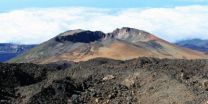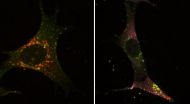(Press-News.org) Scientists from the University of Southampton have identified a repeating trigger for the largest explosive volcanic eruptions on Earth.
The Las Cañadas volcanic caldera on Tenerife, in the Canary Islands, has generated at least eight major eruptions during the last 700,000 years. These catastrophic events have resulted in eruption columns of over 25km high and expelled widespread pyroclastic material over 130km. By comparison, even the smallest of these eruptions expelled over 25 times more material than the 2010 eruption of Eyjafjallajökull, Iceland.
By analysing crystal cumulate nodules (igneous rocks formed by the accumulation of crystals in magma) discovered in pyroclastic deposits of major eruptions, the scientists found that pre-eruptive mixing within the magma chamber – where older cooler magma mixed with younger hotter magma – appears to be the repeating trigger in large-scale eruptions.
These nodules trapped and preserved the final magma beneath the volcano immediately before eruption. Dr Rex Taylor, Senior Lecturer in Ocean and Earth Science at the University of Southampton, investigated nodules and their trapped magma to see what caused the eruptions. He found that the nodules provide a record of the changes occurring in the magma plumbing right through to the moment the volcano erupted.
Dr Taylor says: "These nodules are special because they were ripped from the magma chamber before becoming completely solid – they were mushy, like balls of coarse wet sand. Rims of crystals in the nodules grew from a very different magma, indicating a major mixing event occurred immediately before eruption. Stirring young hot magma into older, cooler magma appears to be a common event before these explosive eruptions."
Co-author of the study, Dr Tom Gernon, Lecturer in Ocean and Earth Science at the University of Southampton, says: "The analysis of crystal nodules from the volcano documents the final processes and changes immediately prior to eruption – those triggering the catastrophic eruptions. The very presence of mushy nodules in the pyroclastic deposits suggests that the magma chamber empties itself during the eruption, and the chamber then collapses in on itself forming the caldera."
The Las Cañadas volcano is an IAVCEI (International Association of Volcanology and Chemistry of the Earth's Interior) Decade Volcano – identified by the international community as being worthy of particular study in light of their history of large, destructive eruptions and proximity to populated area.
Dr Gernon, who is based at the National Oceanography Centre at Southampton's waterfront campus with Dr Taylor, adds: "Our findings will prove invaluable in future hazard and risk assessment on Tenerife and elsewhere. The scale of the eruptions we describe has the potential to cause devastation on the heavily populated island of Tenerife and major economic repercussions for the wider European community."
INFORMATION:
The paper is published in the latest issue of the open access journal Scientific Reports.
Scientists identify trigger for explosive volcanic eruptions
2012-10-12
ELSE PRESS RELEASES FROM THIS DATE:
The body's own recycling system
2012-10-12
Almost everything that happens inside a cell, including autophagy, is tightly regulated on a biochemical level. Like that, the cell makes sure that processes only take place when they are needed and that they are shut off when the need has expired. "Inside the cell, there exists a network of molecules. Between them, information is constantly being exchanged," says Schmitz, head of the research group "Systems-oriented Immunology and Inflammation Research" at HZI, who also holds a chair at the Otto von Guericke University in Magdeburg. "In a way, it looks like a big city ...
The worst noises in the world: Why we recoil at unpleasant sounds
2012-10-12
In a study published in the Journal of Neuroscience and funded by the Wellcome Trust, Newcastle University scientists reveal the interaction between the region of the brain that processes sound, the auditory cortex, and the amygdala, which is active in the processing of negative emotions when we hear unpleasant sounds.
Brain imaging has shown that when we hear an unpleasant noise the amygdala modulates the response of the auditory cortex heightening activity and provoking our negative reaction.
"It appears there is something very primitive kicking in," says Dr Sukhbinder ...
Kidney grafts function longer in Europe than in the United States
2012-10-12
Kidney transplants performed in Europe are considerably more successful in the long run than those performed in the United States. While the one-year survival rate is 90% in both Europe and the United States, after five years, 77% of the donor kidneys in Europe still function, while in the United States, this rate among white Americans is only 71%. After ten years, graft survival for the two groups is 56% versus 46%, respectively. The lower survival rates compared to Europe also apply to Hispanic Americans, in whom 48% of the transplanted kidneys still function after ten ...
Neuroscientists from Louisiana Tech University to present at international conference
2012-10-12
RUSTON, La. – Dr. Mark DeCoster, the James E. Wyche III Endowed Professor in Biomedical Engineering at Louisiana Tech University, will lead a team of Louisiana Tech neuroscientists in presenting a lecture at the Society for Neuroscience's (SfN) annual meeting, October 15 in New Orleans.
The lecture titled, "Randomization of submaximal glutamate stimulus to interpret astrocyte effect on calcium dynamics," will be featured as part of Neuroscience 2012 – SfN's annual meeting that provides the world's largest forum for neuroscientists to debut research and network with colleagues ...
'Invisibility' could be a key to better electronics
2012-10-12
CAMBRIDGE, Mass. — A new approach that allows objects to become "invisible" has now been applied to an entirely different area: letting particles "hide" from passing electrons, which could lead to more efficient thermoelectric devices and new kinds of electronics.
The concept — developed by MIT graduate student Bolin Liao, former postdoc Mona Zebarjadi (now an assistant professor at Rutgers University), research scientist Keivan Esfarjani, and mechanical engineering professor Gang Chen — is described in a paper in the journal Physical Review Letters.
Normally, electrons ...
Prostate cancer: Curcumin curbs metastases
2012-10-12
Powdered turmeric has been used for centuries to treat osteoarthritis and other illnesses. Its active ingredient, curcumin, inhibits inflammatory reactions. A new study led by a research team at Ludwig-Maximilians-Universität (LMU) in Munich now shows that it can also inhibit formation of metastases.
Prostate cancer is one of the most prevalent malignancies in the Western world, and is often diagnosed only after metastatic tumors have formed in other organs. In three percent of cases, these metastases are lethal. A research team led by PD Dr. Beatrice Bachmeier at LMU ...
Scientists uncover diversion of Gulf Stream path in late 2011
2012-10-12
At a meeting with New England commercial fishermen last December, physical oceanographers Glen Gawarkiewicz and Al Plueddemann from the Woods Hole Oceanographic Institution (WHOI) were alerted by three fishermen about unusually high surface water temperatures and strong currents on the outer continental shelf south of New England.
"I promised them I would look into why that was happening," Gawarkiewicz says.
The result of his investigation was a discovery that the Gulf Stream diverged well to the north of its normal path beginning in late October 2011, causing the warmer-than-usual ...
Cells control energy metabolism via hedgehog signalling pathway
2012-10-12
This press release is available in German.Cancer, diabetes, and excess body weight have one thing in common: they alter cellular metabolism. Scientists from the Max Planck Institute of Immunobiology and Epigenetics in Freiburg and the Medical University of Vienna together with an international research team have jointly resolved a new molecular circuit controlling cellular metabolism. The previously unknown signalling pathway, acting downstream of the hedgehog protein enables muscle cells and brown fat cells to absorb sugars without relying on insulin. Substances that selectively ...
Stem cells from muscle tissue may hold key to cell therapies for neurodegenerative diseases
2012-10-12
WINSTON-SALEM, N.C. – Oct. 12, 2012 – Scientists at Wake Forest Baptist Medical Center have taken the first steps to create neural-like stem cells from muscle tissue in animals. Details of the work are published in two complementary studies published in the September online issues of the journals Experimental Cell Research and Stem Cell Research.
"Reversing brain degeneration and trauma lesions will depend on cell therapy, but we can't harvest neural stem cells from the brain or spinal cord without harming the donor," said Osvaldo Delbono, M.D., Ph.D., professor of internal ...
Veterans are at higher risk of alcohol abuse relapse due to smoking
2012-10-12
(October 12, 2012) In a new study published in Frontiers, Dr Timothy Durazzo and colleagues from the San Francisco VA Medical Center and University of California, San Francisco, expand upon their decade of research showing that smoking while kicking the alcohol habit impairs memory, learning and other cognitive skills--ultimately making it more difficult to weather the long storm of sobriety.
Cigarettes, substance abuse and the military
"Given our strong and consistent research findings in both Veterans and civilians on the ill-effects of chronic smoking, we truly hope ...


